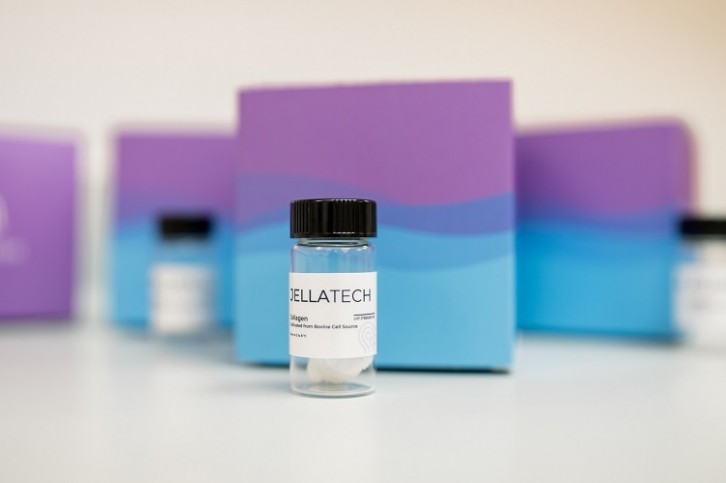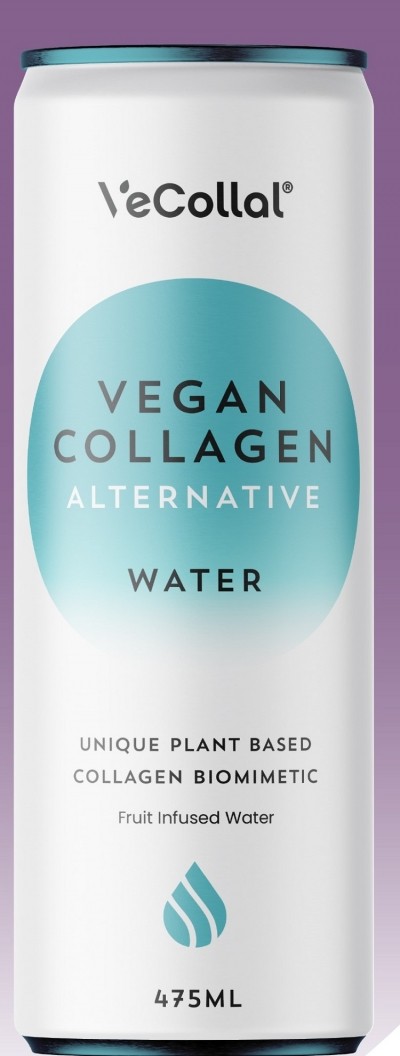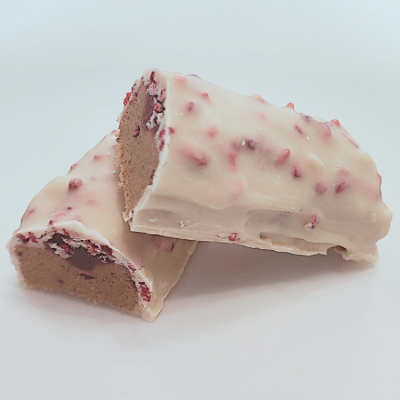Collagen has lengthy been trending within the nutraceuticals house, and for good motive. Analysis suggests the protein brings advantages for pores and skin, hair, nails, joints and bones, and if that’s not sufficient, it’s additionally been linked to muscle restoration.
Whereas it might come throughout like a magic ingredient, not all agree with its manufacturing strategies. Collagen is of course solely present in animal flesh like meat and fish – together with cows, chickens and seafood – that include connective tissue. For vegetarian and vegan shoppers, animal-sourced collagen is due to this fact off the desk.
Environmentally acutely aware shoppers, regardless of their dietary preferences, can also be hesitant to pop a collagen capsule or infused beverage. A typical byproduct of the cattle business, collagen has been linked to deforestation in Brazil.
However not all collagen is sourced from animal bones and connective tissue. A brand new wave of innovators are rethinking manufacturing strategies to supply extra sustainable options to meals, drink, and complement corporations.
Don’t have a cow! How innovators make animal-free collagen
Mobile agriculture is the broad time period used for the manufacturing of agricultural merchandise from cell cultures, be it cell-based meat or precision fermentation-derived dairy. Though not as well-known, cell cultured collagen additionally matches beneath the mobile agriculture umbrella.
Within the US, Jellatech is working to provide human and mammalian collagen in a lab. The North Carolina-headquartered firm believes in a future the place lab-grown options turn out to be commonplace, we had been instructed, to ‘shield our planet, protect its sources, and safeguard its inhabitants’.
The purpose is to create collagen with nearly as good or higher efficiency than the present market commonplace. Jellatech ‘selectively farms’ cell sorts to search out the ‘finest producers’, after which additional refines their surroundings to optimise collagen manufacturing. “Acquiring these optical cells beings with a small pores and skin punch biopsy, from which we isolate cells,” defined founder and CEO Stephanie Michelsen.
“We eradicate the necessity to return to the animal, permitting steady collagen manufacturing from the preliminary biopsy utilizing biotechnological instruments. This course of entails increasing and reusing the cells.”
Having fed the cells a customized media, the start-up harvests the collagen – which it claims is totally free from animal cells or DNA.

As as to whether the ultimate product may very well be labelled vegan or vegetarian, Michelsen defined there may be ‘nonetheless some confusion’ about easy methods to label merchandise made this fashion. Jellatech prefers to emphasize the cruelty-free and slaughter-free facets of the manufacturing. “We depart the choice to classify it as much as the person shoppers and in the end the market primarily based on the voice of the patron.”
Plant-based collagen to disrupt practical food and drinks, right now
Though cell-based collagen is but to enter the market – as a novel meals ingredient, it will be required to endure a pre-market approval course of – different types of animal-free collagens are.
In Belgium, VeCollal is popping to crops to make ‘biomimetic’ variations of human collagen sorts. It does this by first analysing the precise amino acid profile of the human collagen, for example sort 1. It then leverages synthetic intelligence to establish ‘highly effective inductors’ – often natural extracts – that may have a genetic affect on collagen manufacturing.
“By means of exactly mixing all the person amino acids – which often come from the fermentation of glucose – and the inductors in a really particular ratio, we create a biomimetic of human collagen, mimicking each its kind and performance,” founder Tony Van Campen instructed FoodNavigator.
VeCollal’s providing isn’t collagen within the strictest which means of the phrase, as a result of it doesn’t have the standard collagen molecular construction. However when utilized in nutraceuticals or meals and beverage, whereby it’s digested and damaged down into amino acids, Van Campen assured us ‘this doesn’t restrict its efficacy’.
“The important thing to the functioning of VeCollal lies within the actual ratios of amino acids which can be used and the selection of inductors which can be capable of change the signalling perform of collagen peptides as utilized in animal collagen.”
Different plant-based collagen makers exist, together with UK headquartered ProTec Nutra, which has coined its vegan collagen product Vollagen. To make Vollagen, the corporate begins with non-GMO corn, to which it applies a ‘proprietary multistep’ fermentation course of. “This permits us to mix the precise ratio of amino acids discovered inside human collagen,” Josh Perry, distribution and product supervisor at ProTec Nutra, instructed this publication.
How does animal-free collagen examine to its typical counterpart?
For the well being acutely aware client trying to dip their toe within the animal-free collagen market, the massive query will probably be: how does the efficacy of animal-free collagen examine to its typical counterpart?

ProTec Nutra’s Perry assured us Vollagen is simply as bioavailable. “The amino acids are additionally remoted, so they’re prepared for the physique to soak up simply, thus making this equally as bioavailable as some hydrolysed animal collagen.”
In Belgium, VeCollal has analysis to show its ingredient’s value. VeCollal Kind 1, which targets pores and skin and wonder from inside, has been examined extensively over 4 medical trials so far, revealed founder Van Campen. Its newest institutional assessment board (IRB) impartial trial, revealed within the Journal of Purposeful Meals, demonstrated its efficacy – with wrinkle reductions of 32.9% after eight weeks of a day by day dose of 5g.
“It’s very, very efficient – truly outperforming many of the revealed medical trials we discovered on animal collagen peptides.”
Over within the US, Jellatech’s collagen isn’t but in the marketplace, however instructed us it benchmarks high quality by evaluating it to the business commonplace: collagen extracted from mammalian tissue.
“We assess each the bodily properties and the performance of our collagen,” defined Jellatech’s VP of enterprise improvement Jaclyn Shingara. “Jellatech’s collagen boasts an distinctive purity stage, exceeding 95% sort 1 collagen.
“Briefly, our collagen is totally equivalent to that obtained from animals – besides it was produced in a laboratory setting.”
Plant-based vs cell-based manufacturing strategies
Innovators select their animal-free collagen manufacturing strategies for particular causes.
Jellatech believes that if shoppers are searching for a ‘actually equivalent, practical collagen and/or gelatin’, then cell-based expertise is the ‘solely path’ to that purpose. “Our method of harnessing the cells’ pure potential not solely produces however modifies and fine-tunes the collagen as wanted,” defined CEO Michelsen. “We additional improve or ‘increase’ manufacturing utilizing biotechnological instruments.”

The beginning-up is unconvinced the identical collagen will be developed utilizing fermentation or plant-based strategies, contending that these organisms don’t inherently produce collagen and lack the ‘equipment’ to take action exactly.
On the plant-based facet of issues, VeCollal sees benefit in cell cultivated collagen – however just for particular use circumstances. “It’s undoubtedly an attention-grabbing method,” mentioned founder Van Campen. “Nevertheless, we really feel that that is principally helpful for when a collagen molecule is admittedly wanted, for example for topical or medical functions.”
As to its use in nutraceuticals, the corporate believes it’s ‘barely overkill’. The physique solely wants the amino acids, and it must be inspired to provide extra collagen, which is what some collagen peptides appear to do, he instructed this publication.
“There may be completely a spot for recombinant collagen that mimics truly the entire human collagen molecule in the marketplace. Nevertheless, it’s not important for nutraceuticals and we consider it’s additionally challenged by larger worth factors and regulatory constraints globally.”
How does animal-free collagen examine to its typical counterpart in terms of sustainability? And what influence are these new manufacturing strategies having on food and drinks? We’ll reply this and extra within the second a part of our animal-free collagen deep dive.

